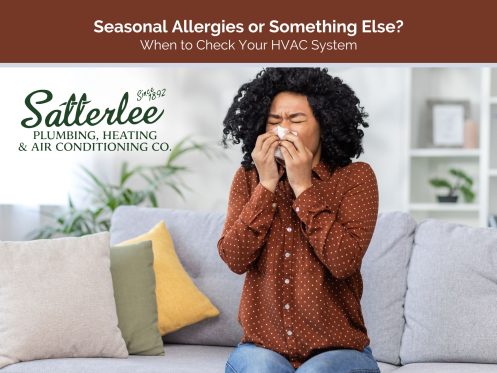Spring in Pittsburg, Kansas, often brings blooming flowers, warmer weather, and unfortunately, seasonal allergies. Sneezing, itchy eyes, and runny noses are common symptoms during this time of year. However, what if these symptoms persist or worsen indoors? It may not just be allergies—it could be poor indoor air quality or even a malfunctioning HVAC system. Understanding the difference is key to maintaining your health and comfort.
Differentiating Seasonal Allergies from Poor Indoor Air Quality
While seasonal allergies are caused by outdoor allergens like pollen, poor indoor air quality can amplify these symptoms or cause entirely different issues. Here’s how to tell the difference:
-
Persistent Respiratory Issues: If symptoms like coughing, wheezing, or shortness of breath worsen indoors, it might be due to contaminants like dust mites, mold spores, or pet dander trapped in your home’s air.
-
Unexplained Fatigue or Dizziness: Poor air quality can reduce oxygen levels indoors, leading to fatigue or dizziness. If you feel unusually tired after spending time at home, your HVAC system might not be circulating fresh air effectively.
-
Musty Odors: A stale or musty smell in your home could indicate mold growth in your HVAC system or ductwork. This odor is a clear sign that your indoor air quality needs attention.
If these symptoms persist despite allergy treatments, it’s time to check your HVAC system.
Carbon Monoxide: A Hidden Danger
Furthermore, malfunctioning HVAC systems can pose serious risks beyond allergens and pollutants, like carbon monoxide (CO) exposure. CO is an odorless and colorless gas that can leak from improperly vented furnaces or gas-powered heating systems. Symptoms of CO poisoning include headaches, nausea, confusion, and dizziness. If multiple family members experience these symptoms simultaneously while at home, evacuate immediately and contact emergency services.
To prevent CO exposure:
-
Install carbon monoxide detectors near sleeping areas and fuel-burning appliances.
-
Schedule regular HVAC inspections to ensure safe operation of heating systems.
How Your HVAC System Impacts Indoor Air Quality and Seasonal Allergies
Your HVAC system plays a vital role in maintaining clean indoor air. Issues such as dirty filters, clogged ductwork, or inadequate ventilation can allow allergens and pollutants to circulate throughout your home. Regular maintenance helps address these issues by:
-
Replacing filters to trap dust and pollen.
-
Cleaning coils and ductwork to prevent mold buildup.
-
Ensuring proper airflow for consistent ventilation.
Choosing an HVAC Contractor in Pittsburg
When selecting an HVAC contractor for inspections or repairs in Pittsburg, Kansas, it’s important to choose a reliable provider. Here are tips for finding the right service:
-
Verify Licensing: Ensure the contractor meets local licensing requirements and holds certifications like NATE (North American Technician Excellence).
-
Check Reviews: Look for positive customer feedback on platforms like Google Reviews or the Better Business Bureau (BBB).
-
Ask About Experience: Choose contractors with proven expertise in handling modern HVAC systems and improving indoor air quality.
-
Request Written Estimates: Avoid verbal quotes—ask for itemized estimates detailing costs for materials and labor.
-
Evaluate Service Options: Select a provider offering comprehensive services like maintenance plans, emergency repairs, and energy-efficient upgrades.
Contact Satterlee Heating and Air
If you’re experiencing persistent allergy-like symptoms or suspect poor indoor air quality in your Pittsburg home, contact Satterlee Heating and Air for professional HVAC inspection and maintenance services. With decades of experience serving the community, Satterlee’s licensed technicians specialize in improving indoor air quality and ensuring safe operation of heating systems.
Don’t let spring allergies—or something worse—disrupt your comfort. Schedule an appointment with Satterlee Heating and Air today for reliable residential HVAC services in Pittsburg, Kansas. Let us help you breathe easier this season!


